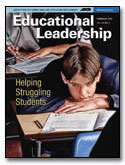I think about my former student Deidre often. She would be grown now, and I often wonder where she is and whether our care for her made a difference in her life. Deidre's 1st grade picture stands clearly in sight on my office bookcase, her curly red hair accented by her deep blue eyes. Deidre was classified as a special education student. As is true of most students, her learning problems did not fit into any predetermined category. Deidre's mother physically and psychologically abused her. Despite our reports of the abuse, Deidre fell through the cracks in the local child and family services system. Each morning, she came in delighted to be in school—surrounded by people who cared deeply about her. We cringed at what Deidre might face when she returned home each afternoon.
I keep this picture close at hand so that my anger, grief, and frustration for the many “Deidres” I have known will be continually stoked. Deidres inhabit all our schools. Some are abused children. Others have aches and pains but no hope that a caring adult will get them to a doctor. Many live in poverty. Principals shudder at the “percent of poverty” line item in demographic printouts because we recognize the devastation that often accompanies that term. We wonder about Saturdays, Sundays, and holidays for kids who hungrily anticipate school lunches—and who may anxiously yearn for the love and understanding of their teachers. Many of these struggling students are plugged into such handy classifications as “emotionally disturbed” or “behavior disordered.”
Memories of Deidre prompt frequent questions for me as an educator who loves kids. Have schools and educators become immune to children who are so “left behind” that no federal mandates or repeated psychometric assessments can lead them into the full lives they deserve? Can we still feel rage about the injustices in our society that perpetuate poverty and neglect? Do we weep over our inability to provide students with promise and hope? How can we more effectively help children from bleak home situations learn—and how can we assure them that we love them unconditionally? At times, such questions wake me from sleep.
Rage and grief are powerful emotions. Thinking of the Deidres of our schools gives me energy to persist beyond the exhaustion I often feel—the desire to just do my job and go home. This energy helps me tolerate “the system” and endure the endless paper storm that can distract me from true education work.
My tears about children in harsh situations like Deidre's stem partly from frustration at my own helplessness and partly from anger at a system that seems unable, and at times unwilling, to address the real needs of kids. They become tears of rage when I think of laws, policies, and organizational designs that recommend—no, that dictate—that schools take actions that seem blind to flesh-and-blood children. My anger rises to a flash point when I see each student's learning being assessed on the same day and with the same test—no matter what personal stories accompany a particular struggling child to the schoolhouse.
Educators often fall into the trap of blaming—blaming parents, former schools, the central office, or even an economic system that permits poverty and violence to flourish in a society replete with resources. When frustration runs high, we may even blame the kids themselves. But our primary job is to hold children facing deprivation close to our hearts. Students like Deidre—whose lives are often in tatters outside their school day—have little hope except for that which we provide.
We placed Deidre with a loving teacher. Beyond discussing how to help Deidre in the mandated IEP meetings, we talked with Deidre's grandmother—one of the true caretakers in her life—and offered her advice on how to help her granddaughter. Deidre learned to read because her teacher understood that differentiated instruction is more than a buzzword. The reading specialist carved out extra time to work with her, and the physical education teacher consistently acknowledged her talents. Her 5th grade “buddy” became her school big sister. When necessary, we flew “under the radar” of school regulations.
I will not soon remove Deidre's picture from my bookcase. Over and over, she reminds me that my work ultimately touches the lives of children. Each day, I ask her to stoke my anger at all kinds of abuse, to strengthen my determination to serve kids like her, and to argue for a system that recognizes that learning can only happen within a culture of caring.
